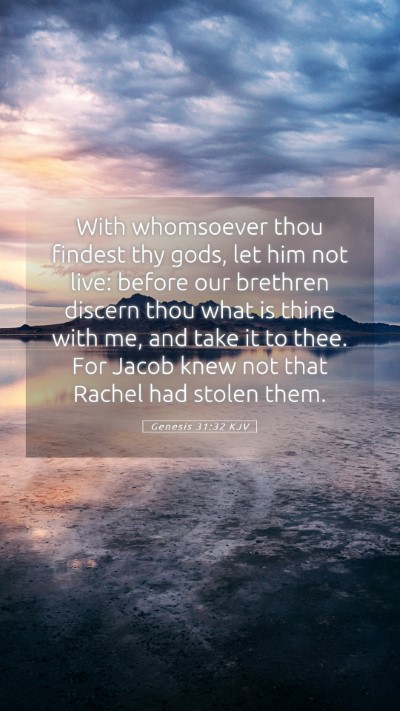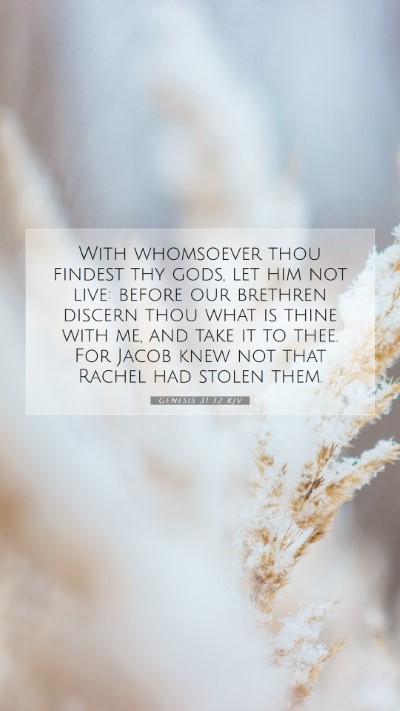Understanding Genesis 31:32
Genesis 31:32 states, "With whomsoever thou findest thy gods, let him not live: before our brethren discern thou what is thine with me, and take it to thee." This verse is a key moment in the narrative of Jacob's return to Canaan, embodying themes of deception and conflict within family dynamics.
Bible Verse Commentary
Contextual Overview:
This verse occurs as Jacob confronts Laban, who has pursued him for allegedly stealing household gods. Jacob, unaware that Laban's daughter Rachel has taken them, declares a serious oath in front of witnesses concerning the matter. This moment encapsulates the tension between Laban and Jacob, rooted deeply in past grievances.
Insights from Public Domain Commentaries
- Matthew Henry: Henry emphasizes the irony of Jacob's statement, noting that he condemns the theft while ignorant of Rachel's actions. He highlights Jacob's character development, suggesting that despite his previous deception with Esau and Laban, he now seeks earnestness and integrity.
- Albert Barnes: Barnes points out that Jacob's strong words reflect his growing confidence and his concern for purity within his household. Jacob's approach is viewed as defensive yet firm, establishing boundaries as he prepares to leave with his family.
- Adam Clarke: Clarke provides insight into the cultural practices surrounding household gods, discussing their significance to ancient families. He notes that Jacob's blood oath becomes particularly poignant in light of Rachel's secret, which adds dramatic tension to the narrative.
Significance and Themes
This verse serves several key purposes within the larger narrative of Genesis:
- Conflict Between Jacob and Laban: It illustrates the escalating tension between Jacob and his father-in-law Laban, a theme that runs throughout the entire chapter.
- The Issue of Idolatry: The mention of household gods brings forth the issue of spiritual integrity, as Jacob unknowingly calls for judgment on Rachel for idol theft.
- Guilt and Innocence: Jacob's declaration of "let him not live" juxtaposes his own guilt in past deceptions, showcasing the human propensity to criticize others without acknowledging one's own failings.
Application for Today
This verse offers rich insights for personal reflection and application:
- Honesty in Relationships: The importance of integrity in our dealings with others is highlighted, encouraging us to examine our own actions and attitudes.
- Understanding Family Dynamics: The various tensions reflected in this verse resonate with contemporary family struggles, inviting us to seek resolution with love and fairness.
- Caution Against Idolatry: This scripture serves as a reminder to evaluate what 'gods' we may hold dear in our own lives that distract us from true worship.
Bible Study Insights
For those engaging in Bible study lessons or online Bible study, Genesis 31:32 can prompt discussions around:
- The nature of covenants and oaths in relationships.
- The historical context of idol worship and its implications for the Hebrew people.
- Comparative analysis with other instances of familial conflict in Scripture.
Cross References
Additional verses related to this passage include:
- Genesis 30:30 - Discusses Jacob's dealings with Laban.
- Genesis 35:2-4 - Addresses the removal of foreign gods from Jacob's household.
- Exodus 20:3 - Highlights the demand for exclusive worship of God.
Conclusion
In summary, Genesis 31:32 serves as a powerful reminder of the complexities of human relationships, the struggle against idolatry, and the need for integrity in our lives. It calls for careful consideration and contextual Bible verse interpretations, encouraging readers to engage deeply with the text for a better understanding of Scripture.


